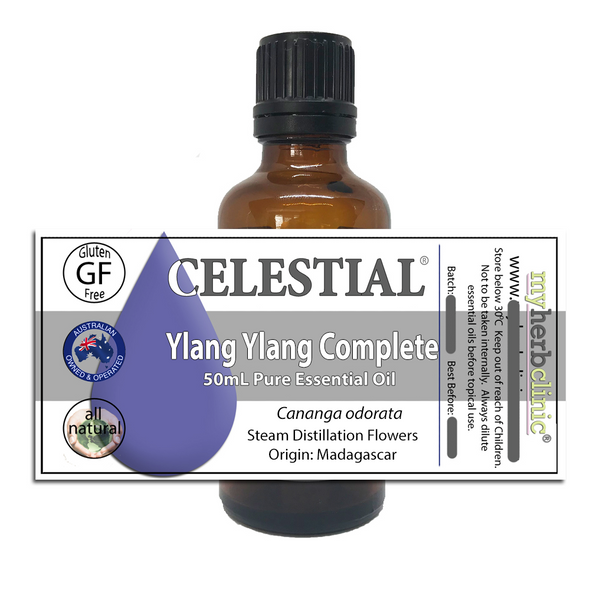CELESTIAL®
CELESTIAL ® Ylang Ylang 1st Essential Oil Madagascar, Cananga odorata - Pure Floral Aroma
Description
Celestial Ylang Ylang 1st Essential Oil – Cananga odorata
Botanical Name: Cananga odorata
Origin: Madagascar
Method: Steam Distillation
Part Used: Flowers
Perfumery Note: Top to Middle, excellent Fixative
Scent Profile: sweet, floral, rich, exotic
Immerse yourself in the sweet, floral aroma of Celestial Ylang Ylang 1st Essential Oil, derived from the flowers of Cananga odorata. Known for its rich, exotic fragrance, this essential oil brings a lush, tropical note to your home, perfect for creating an inviting and calming environment.
Carefully steam-distilled from the first fraction of Ylang Ylang flowers, this oil offers the purest and most fragrant expression of the plant. Its heady, floral scent is ideal for blending in aromatherapy diffusers, candles, or luxurious DIY body care creations, adding a touch of elegance and exotic aroma to your daily rituals.
Usage Suggestions:
- Diffuse in your home to fill your space with a tropical floral scent.
- Incorporate into DIY body oils, bath blends, or candles for a luxurious touch.
- Blend with citrus or woody oils to create unique aromatic experiences.
Let Celestial Ylang Ylang 1st Essential Oil transport your senses with its lush floral aroma, bringing a sophisticated and tropical essence to your space.
Topical Application Information:
This essential oil is pure and undiluted, so if you wish to use it on your skin it will have to be diluted first. The general guide to using essential oils on your skin is that they should be diluted to a maximum of 3-5% in a carrier oil. For Ajowan oil it is recommended not to exceed 1.4% dilution for topical use.
Essential Oil Safety:
Always dilute essential oils before applying them to your skin as when undiluted they may cause skin irritations. It is always a good idea to do a small patch test somewhere like the back of your hand when using a new essential oil for the first time.
DO NOT ingest essential oils. It is against the TGA (Therapeutic Goods Administration) Guidelines to suggest ingestion of essential oils in Australia. This is due to safety concerns around the harm an undiluted and highly concentrated essential oil can do when ingested. There are very few exceptions to this, which include a small number of essential oils allowed to be used in the food manufacturing industry in highly diluted amounts for flavouring and scent (such as Lavender and Peppermint), or when under the care of a qualified Naturopath or Aromatic Medicine Practitioner (holds recognised qualifications, and is a member of a Professional Association granting TGA exemptions).
It is always best to avoid using essential oils on or around your pets. Dogs process most essential oils similar to how humans do, and will usually not be bothered by most essential oils being diffused in a well ventilated space. Many dog shampoos and conditioners also contain essential oils. However we recommend you never leave a dog unsupervised in a room with an essential oil diffuser on. Cats do not tolerate essential oils and small amounts may be harmful, even using a diffuser in the same room may cause toxicity.
Essential Oil Storage:
Essential oils can last well beyond their best before in most cases when stored well. Minimise the time your lids are removed from bottles to reduce oxidisation, keep your lids on tight, and store out of light in a cool place.


















